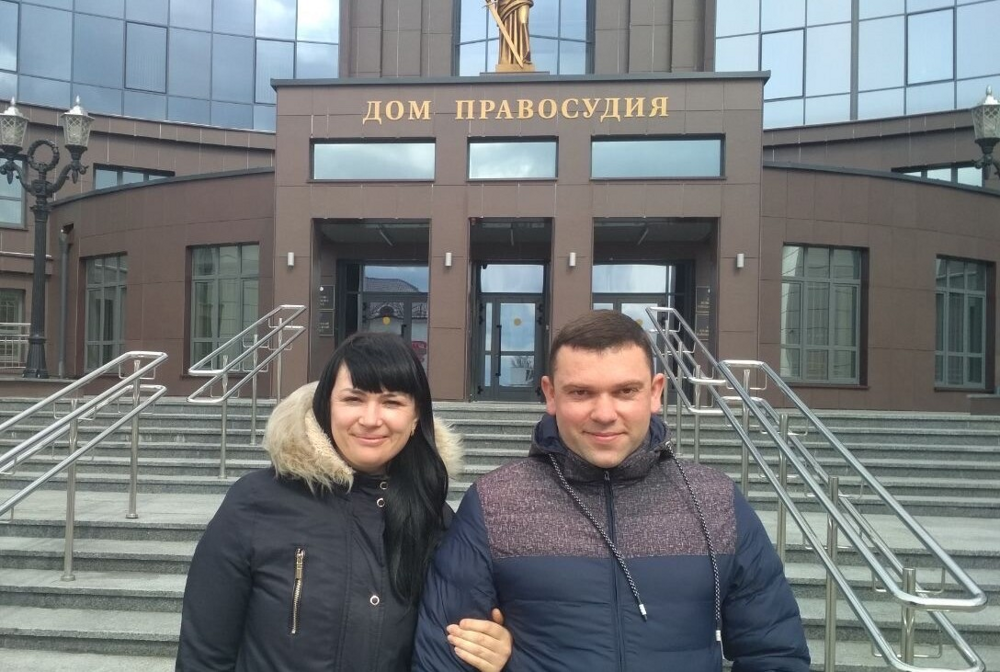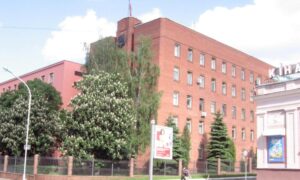If Parliament approves a draft Law, individuals will be stripped of the possibility to complain to the UN Human Rights Committee about violations of their rights under the International Covenant on Civil and Political Rights. Deputy Foreign Minister Igor Nazaruk alleged “arbitrary expansion” of the Committee’s powers. Human rights groups warn this “will close one of the last remaining opportunities to seek justice for human rights violations”. In 2021, the Committee found the regime violated Valentin Borovik’s rights when it fined him for leading an unregistered Pentecostal community.

Individuals from Belarus are likely to be stripped of the possibility to complain to the United Nations Human Rights Committee about violations of their rights under the International Covenant on Civil and Political Rights. The Council of Ministers has proposed this in a draft Law expected to be considered in the lower chamber of Parliament in the autumn. Among the many complaints from Belarus to the UN Committee, some have concerned violations of the right to freedom of religion or belief.
In 2021, in its latest decision related to freedom of religion or belief, the UN Human Rights Committee found that the regime had violated the rights of Pentecostal leader Valentin Borovik when it fined him nine months’ minimum wages for leading an unregistered religious community (see below).
Three separate complaints from Jehovah’s Witnesses are among those pending with the UN Committee. Dmitry Mozol lodged a complaint in November 2021 after being fined four months’ average wages for refusing on grounds of conscience to undergo nearly four weeks of reservist military training. Earlier, Andrei Kuzin lodged a complaint after a court fined him more than a month’s average wage for leading a Jehovah’s Witness meeting on his property. Kirill Dashkovsky complained of being fined after police raided a meeting for worship (see below).
In earlier decisions, the UN Committee found that the rights of an executed prisoner’s family had been violated when the regime refused to release the body for burial. In another case, the UN Committee found that the rights of two Hare Krishna devotees had been violated when the regime refused to register a nationwide Hare Krishna organisation as well as a local community in Minsk (see below).
Seven local human rights groups condemned the proposed withdrawal from the Optional Protocol and called for it to be abandoned. They noted that “although the authorities consistently ignored the Committee’s decisions, the state was under an obligation to respond to the Committee, explaining the relevant issue and providing information on measures taken” (see below).
A further appeal from five of the seven human rights groups – joined by international human rights groups – warned that the move “will close one of the last remaining opportunities to seek justice for human rights violations in Belarus” (see below).
A Deputy Foreign Minister Igor Nazaruk complained of what he called the “arbitrary expansion of the powers of the Human Rights Committee, creating additional unreasonable obligations for the state, which it did not accept when joining this act” (see below).
Member of the Standing Committee of the House of Representatives on Human Rights, Ethnic Relations and the Media Lyudmila Zdorikova is overseeing passage of the draft Law. Her secretary refused to put Forum 18 through to her to ask why the regime plans to remove the right of individuals to lodge complaints to the UN Committee when their human rights have been violated. “We do not give any comments on this issue,” the secretary said (see below).
Asked if there is any chance the authorities will change their mind and listen to the human rights defenders, one human rights defender who has been involved in freedom of religion or belief cases told Forum 18 that it would be “a miracle”.
Belarus is not a member of the Council of Europe or party to the European Convention on Human Rights and Fundamental Freedoms, so individuals and organisations cannot bring cases to the European Court of Human Rights in Strasbourg.
Draft Law to end complaints to UN Human Rights Committee
On 5 August, the Council of Ministers sent to the House of Representatives, the lower chamber of Parliament, a draft Law on the denunciation by the Republic of Belarus of the Optional Protocol to the International Covenant on Civil and Political Rights, according to the parliamentary website.
If adopted by both chambers of Parliament and signed into law, Belarus would then inform the UN Secretary General and cease to be a party to the Optional Protocol three months later.
This would remove the possibility for individuals from Belarus to complain to the UN Human Rights Committee about violations of their rights under the International Covenant on Civil and Political Rights (ICCPR), including over the right to freedom of religion or belief.
On 19 August, at a meeting of the Standing Committee of the House of Representatives on Human Rights, National Relations and the Media, a Deputy Foreign Minister Igor Nazaruk, tried to justify the move.
“Among the reasons for this step is the arbitrary expansion of the powers of the Human Rights Committee, creating additional unreasonable obligations for the state, which it did not accept when joining this act,” the House of Representatives website cited Nazaruk as telling the meeting the same day. “At the same time, Belarus retains its participation in the International Covenant on Civil and Political Rights itself.”
It appears that the Law will require only one reading in the House of Representatives before being sent to Parliament’s upper chamber, the Council of the Republic. The draft Law is due to be considered at the House of Representatives ninth session, which is scheduled to begin on 20 September and likely to last for most of the rest of 2022. No date appears to have yet been set for the House of Representatives to consider the draft Law.
The regime does not allow opposition parties to win election to Parliament. The Organisation for Security and Co-operation in Europe found that the November 2019 elections for the House of Representatives “did not meet important international standards for democratic elections”.
Belarus acceded to the ICCPR Optional Protocol in 1992. The Human Rights Committee has considered more than 175 complaints from Belarus – many of them involving more than one complainant – since 2000. The Committee is still considering other complaints from Belarus. Some of these relate to violations of individuals’ rights to freedom of religion or belief (see below).
“We do not give any comments on this issue”
Member of the Standing Committee of the House of Representatives on Human Rights, Ethnic Relations and the Media Lyudmila Zdorikova is listed as overseeing passage of the draft Law.
On 31 August, Forum 18 called Zdorikova to find out why Belarus intends to withdraw from the Optional Protocol. However, her secretary refused to comment or transfer the call to her superior. “We do not give any comments on this issue, you have to ask somebody else,” the secretary told Forum 18 before putting the phone down.
Also on 31 August, the secretary at the House of Representatives Information and Analysis Department asked for questions to be sent in writing. Forum 18 sent an official enquiry before the start of the working day of 1 September. Forum 18 received no response by the middle of the working day in Minsk of 2 September.
The phone of the Chair of the House of Representatives Standing Committee on Human Rights, National Relations and the Media, Gennady Davydko, went unanswered each time Forum 18 called between 31 August and 2 September.
At the Foreign Ministry, the secretary referred all questions to the press service, but the phone went unanswered each time Forum 18 called on 1 and 2 September.
Law “will close one of the last remaining opportunities to seek justice for human rights violations”
Lawyer Natallia Matskevich – who was expelled from the Bar in October 2021 after defending opposition leaders and now teaches in neighbouring Lithuania – thinks the regime decided to withdraw from the UN Human Rights Committee Optional Protocol because the “flood of complaints” from Belarus has significantly increased and the likelihood that the Committee will find violations.
“Complaints of a strategic nature are being filed, which show a complex of violations that stem from general abusive practices and from legislation that is not in conformity with the Covenant [ICCPR],” Matskevich wrote on the Right to Protection website on 19 August. “These complaints are almost impossible to reasonably object to from the point of view of international law, as I see it. And the decisions of the HRC over time on these complaints will show the full scale of what is happening, starting from the spring of 2020.”
Lawyer Matskevich noted that “withdrawal from a universal human rights treaty can be a serious blow to the reputation of the state. Judging by the history of international relations, this situation is extraordinary.”
Matskevich pointed out that removal of one of the UN human rights defending mechanisms will not solve the problem for the state. She insisted that it is not the consequences – Belarusians’ complaints to the Committee – which have to be eliminated, but their cause – human rights violations by the state.
On 22 August, seven local human rights groups – including Viasna (Spring), the Belarusian Helsinki Committee and Human Constanta – condemned the proposed withdrawal from the Optional Protocol and called for it to be abandoned. They noted that “although the authorities consistently ignored the Committee’s decisions, the state was under an obligation to respond to the Committee, explaining the relevant issue and providing information on measures taken”.
The human rights groups also called on the regime to “provide citizens with the opportunity to use international mechanisms for the protection of human rights, taking measures to expand such opportunities, and not exclude existing ones” and “to comply with international obligations in the field of human rights, bringing its legislation and practice of its application in accordance with them”.
The human rights groups called on international organisations also to condemn the move publicly.
On 29 August, a further appeal from five of the seven human rights groups – joined by international human rights groups – condemned the proposed move, warning that it “will close one of the last remaining opportunities to seek justice for human rights violations in Belarus”. The appeal added: “The move would also set a dangerous precedent for states seeking to negate their international human rights obligations to avoid unwanted scrutiny.”
The appeal noted that Belarus is not party to the European Convention on Human Rights, which means that individuals cannot bring cases to the European Court of Human Rights in Strasbourg.
UN Human Rights Committee cases pending
One case related to freedom of religion or belief pending with the UN Human Rights Committee is that of Dmitry Mozol. The 33-year-old Jehovah’s Witness lodged a petition to the Committee in November 2021 after being fined for refusing to undergo nearly four weeks of reservist military training on grounds of conscience. A court in Pinsk fined him four months’ average wages in February 2021, a criminal punishment he failed to overturn on appeal. The UN Committee asked the Belarus regime questions about the case on 22 December 2021.
Another pending case was lodged by Andrei Kuzin in June 2016. In December 2014 a court in Borisov fined him more than a month’s average wage for leading a Jehovah’s Witness meeting on his property. The UN Committee asked the Belarus regime questions about the case on 10 April 2018.
Kirill Dashkovsky lodged a complaint to the Human Rights Committee in November 2014 after a court in Rogachev fined him in August 2012 for leading a meeting for worship in a home. The court had earlier acquitted him and the home owner.
Forum 18 has been unable to find that the regime has responded to the UN Committee in either Mozol’s or Kuzin’s case.
UN Human Rights Committee finds violations
The most recent UN Committee decision relating to freedom of religion or belief, made public on 17 November 2021, found that Belarus had violated the rights of Pentecostal Christian Valentin Borovik (CCPR/C/131/D/2695/2015).
In March 2008, police and other state officials raided a meeting in a church member’s home of the small unregistered congregation Borovik led in the western town of Mosty. In June 2008 a local court fined him nine months’ minimum wages for leading an unregistered religious community and the same month Grodno Regional Court rejected his appeal. The Supreme Court rejected his supervisory appeal in March 2009. He had to pay the fine.
Borovik submitted his appeal to the UN Human Rights Committee in March 2011, arguing that the punishment violated his rights under Article 18 of the ICCPR (“Freedom of thought, conscience and religion”). The Committee found that “by convicting and fining [Borovik] for creating and leading a religious organisation without State registration and by restricting [Borovik]’s right to peacefully manifest his religious beliefs in community with others”, the regime had violated his rights.
It said the regime “has not specifically explained why [Borovik] was convicted and fined for engaging in religious worship in community with others without having met the pre-condition for official registration or why imposing such a pre-condition was at all necessary to ensure the protection of the freedom of religion or belief within the meaning of article 18 (1) of the Covenant”.
Vladislav Kovalev was executed in March 2012 after being sentenced to death for alleged involvement in the April 2011 bombing in the Minsk metro. He, his family and human rights defenders rejected the charges. After his execution, his mother, Lyubov Kovaleva, tried to claim her son’s body for a Christian burial, telling Forum 18 that “it is important to give Vladislav – like other people – a Christian burial”. The authorities refused.
In response to Lyubov Kovaleva’s and her family’s complaint, in October 2012 the UN Human Rights Committee found (CCPR/C/106/D/2120/2011) that, among other violations, Belarus had violated Article 7 (“Freedom from torture and cruel, inhuman or degrading treatment or punishment”) of the ICCPR.
The Committee stated: “The complete secrecy surrounding the date of the execution and the place of burial, as well as the refusal to hand over the body for burial in accordance with the religious beliefs and practices of the executed prisoner’s family have the effect of intimidating or punishing the family by intentionally leaving it in a state of uncertainty and mental distress”.
“The State party,” the UN Human Rights Committee ruled, “is under an obligation to provide the authors with an effective remedy, including appropriate compensation for the anguish suffered, and disclosure of the burial site of Mr. Kovalev.”
The Human Rights Committee added: “The State party is also under an obligation to prevent similar violations in the future” by amending laws “so as to bring it in line with the State party’s obligations under article 7 of the Covenant”.
The Committee did not examine Kovaleva’s and her family’s claim that the Belarusian authorities had also violated the ICCPR’s Article 18 (“Freedom of thought, conscience and religion”).
In July 2003, two Hare Krishna devotees Sergei Malakhovsky and Alexander Pikul filed a complaint to the UN Human Rights Committee after Minsk Central District Court in 2002 rejected their appeal to register a nationwide Hare Krishna association due to the absence of premises designated for worshipping and a complaint about sanitation and fire safety norms. The local Minsk community headed by Malakhovsky was also denied compulsory local re-registration, which triggered six official warnings for unapproved religious activity. The Committee found in July 2005 (CCPR/C/84/D/1207/2003) that their rights had been violated. (END)


